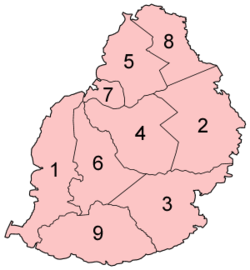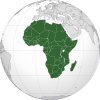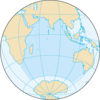Mauritius: Difference between revisions
mNo edit summary |
No edit summary |
||
| Line 71: | Line 71: | ||
Uninhabited until the 17th century, the island was ruled first by the Dutch and then by the French after the Dutch abandoned it. The British took control during the Napoleonic Wars and Mauritius became independent from the UK in 1968. Mauritius is a [[parliamentary republic]] and is a member of the [[Southern African Development Community]], the [[Common Market for Eastern and Southern Africa]], the [[African Union]] and the [[Commonwealth of Nations]]. |
Uninhabited until the 17th century, the island was ruled first by the Dutch and then by the French after the Dutch abandoned it. The British took control during the Napoleonic Wars and Mauritius became independent from the UK in 1968. Mauritius is a [[parliamentary republic]] and is a member of the [[Southern African Development Community]], the [[Common Market for Eastern and Southern Africa]], the [[African Union]] and the [[Commonwealth of Nations]]. |
||
The main languages spoken in Mauritius are [[Mauritian Creole]], French and English. English is the only official language but the [[lingua franca]] is Creole and the newspapers and television programmes are usually in French.<ref name="brandeis.edu">[http://www.brandeis.edu/coexistence/linked%20documents/Nigel%20-%20Mauritius%20FINAL.pdf Coexistence International at Brandeis University]</ref> Ethnically, the majority of the population is [[Indo-Mauritian|Indian]], but there are also many [[Mauritian Creole people|people of |
The main languages spoken in Mauritius are [[Mauritian Creole]], French and English. English is the only official language but the [[lingua franca]] is Creole and the newspapers and television programmes are usually in French.<ref name="brandeis.edu">[http://www.brandeis.edu/coexistence/linked%20documents/Nigel%20-%20Mauritius%20FINAL.pdf Coexistence International at Brandeis University]</ref> Ethnically, the majority of the population is [[Indo-Mauritian|Indian]], but there are also many [[Mauritian Creole people|people of African descent]] on the island. There are also [[Franco-Mauritian|European]] and [[Sino-Mauritian|Chinese]] minorities. It is the only African nation where the largest religion is [[Hinduism in Mauritius|Hinduism]] although [[Christianity in Mauritius|Christianity]] and [[Islam in Mauritius|Islam]] also have significant populations. |
||
The island of Mauritius is renowned for having been the only known home of the [[dodo]]. First sighted by Europeans around 1600 on Mauritius, the dodo became extinct less than eighty years later. Mauritius has an [[high income economy|upper-middle income economy]]. |
The island of Mauritius is renowned for having been the only known home of the [[dodo]]. First sighted by Europeans around 1600 on Mauritius, the dodo became extinct less than eighty years later. Mauritius has an [[high income economy|upper-middle income economy]]. |
||
| Line 230: | Line 230: | ||
== Demographics == |
== Demographics == |
||
{{Main|Demographics of Mauritius}} |
{{Main|Demographics of Mauritius}} |
||
The population estimate for the whole republic is 1,264,867. For the island of Mauritius only, as at 31 December 2007, it is 1,227,078.<ref>{{cite web |url=http://www.gov.mu/portal/goc/cso/ei683/toc.htm |title=Population and Vital Statistics, Republic of Mauritius, Year 2007 - Highlights |publisher=Central Statistics Office (Mauritius)|accessdate=2008-05-26 |month=March | year=2008}}</ref> Mauritian society includes people from many different ethnic groups. The republic's residents are the descendants of people from India ([[Indo-Mauritian]]), continental Africa |
The population estimate for the whole republic is 1,264,867. For the island of Mauritius only, as at 31 December 2007, it is 1,227,078.<ref>{{cite web |url=http://www.gov.mu/portal/goc/cso/ei683/toc.htm |title=Population and Vital Statistics, Republic of Mauritius, Year 2007 - Highlights |publisher=Central Statistics Office (Mauritius)|accessdate=2008-05-26 |month=March | year=2008}}</ref> Mauritian society includes people from many different ethnic groups. The republic's residents are the descendants of people from India ([[Indo-Mauritian]]), continental Africa ([[Mauritian Creole people]] usually known as 'Creoles' in Mauritian Creole), France ([[Franco-Mauritian]]) and China ([[Sino-Mauritian]]), among other places. |
||
=== Religion === |
=== Religion === |
||
| Line 236: | Line 236: | ||
Hindus make up 48%, Roman Catholic 23.6%, other Christians 8.6%, Muslim 16.6% and non-religious 0.4% while other and unspecified religions up to 2.5 and 0.3% respectively.<ref>https://www.cia.gov/library/publications/the-world-factbook/geos/mp.html</ref> |
Hindus make up 48%, Roman Catholic 23.6%, other Christians 8.6%, Muslim 16.6% and non-religious 0.4% while other and unspecified religions up to 2.5 and 0.3% respectively.<ref>https://www.cia.gov/library/publications/the-world-factbook/geos/mp.html</ref> |
||
Most |
Most Franco-Mauritians and Mauritian Creoles are Christian. Almost all the Muslims and the Hindu population are of Indian origin. Some Muslims are also from the Middle East{{cn}}. Hindus include Mauritians of ancestry coming from [[Marathi]], [[Tamil language|Tamil]], [[Hindi]], [[Bhojpuri]] and [[Telugu]] speaking regions of India. These languages are still preserved through the existence of different socio-cultural organizations and with the school systems obliging primary schools' students to study an oriental language. A minority of people are of Chinese descent, many of whom have embraced Christianity, following mainly Roman Catholicism. Some follow Buddhism and Confucian traditions. |
||
=== Language === |
=== Language === |
||
| Line 242: | Line 242: | ||
In Mauritius, people switch languages according to the situation.<ref name="chass.utoronto.ca"/> French and English, which have long enjoyed greater social status, are favored in educational and professional settings.<ref name="chass.utoronto.ca">[http://www.chass.utoronto.ca/~cpercy/courses/6362-chiba.htm English Usage in Mauritius]</ref> Also, most newspapers and media communications are in French.<ref name="m2002.thecgf.com">[http://m2002.thecgf.com/Nations/Africa/Mauritius/default.asp Facts and Figures]</ref> Mauritian Créole, which is spoken by 90 percent of the population, is considered to be the native language of the country and is used most often in informal settings.<ref name="chass.utoronto.ca"/> It was developed in the 18th century by slaves who used a [[pidgin language]] to communicate with each other as well as with their French masters, who did not understand the various African languages. The pidgin evolved with later generations to become a casual language.<ref name="m2002.thecgf.com"/> Mauritian Creole is a [[French-based creole]] due to its close ties with French pronunciation and vocabulary.<ref>{{cite book |last=Holm |first=J. |authorlink= |title=Pidgins and Creoles |publisher=[[Cambridge University Press]] |year=1989 |location=New York |pages=476 |url=http://books.google.ca/books?id=PcD7p9y3EIcC&printsec=frontcover&source=gbs_v2_summary_r&cad=0#v=onepage&q=&f=false}}, p.353.</ref> |
In Mauritius, people switch languages according to the situation.<ref name="chass.utoronto.ca"/> French and English, which have long enjoyed greater social status, are favored in educational and professional settings.<ref name="chass.utoronto.ca">[http://www.chass.utoronto.ca/~cpercy/courses/6362-chiba.htm English Usage in Mauritius]</ref> Also, most newspapers and media communications are in French.<ref name="m2002.thecgf.com">[http://m2002.thecgf.com/Nations/Africa/Mauritius/default.asp Facts and Figures]</ref> Mauritian Créole, which is spoken by 90 percent of the population, is considered to be the native language of the country and is used most often in informal settings.<ref name="chass.utoronto.ca"/> It was developed in the 18th century by slaves who used a [[pidgin language]] to communicate with each other as well as with their French masters, who did not understand the various African languages. The pidgin evolved with later generations to become a casual language.<ref name="m2002.thecgf.com"/> Mauritian Creole is a [[French-based creole]] due to its close ties with French pronunciation and vocabulary.<ref>{{cite book |last=Holm |first=J. |authorlink= |title=Pidgins and Creoles |publisher=[[Cambridge University Press]] |year=1989 |location=New York |pages=476 |url=http://books.google.ca/books?id=PcD7p9y3EIcC&printsec=frontcover&source=gbs_v2_summary_r&cad=0#v=onepage&q=&f=false}}, p.353.</ref> |
||
Other languages spoken in Mauritius include [[Hindi]], [[Hakka (language)|Hakka]] and [[Bhojpuri language|Bhojpuri]].<ref name="brandeis.edu"/> Most Mauritians are at least bilingual, if not trilingual.<ref name="brandeis.edu"/><ref name="m2002.thecgf.com"/><ref>[http://www.gov.mu/portal/site/Mainhomepage/menuitem.a42b24128104d9845dabddd154508a0c/?content_id=dd86a309d9ece110VgnVCM1000000a04a8c0RCRD Circular Migration Agreement will enable Mauritians work in France]</ref><ref>[http://www.gov.mu/portal/goc/webattorney/file/briefing.pdf Most Mauritians Bilingual]</ref> |
Other languages spoken in Mauritius include [[Hindi]], [[Tamil language|Tamil]], [[Telugu language|Telugu]], [[Marathi language|Marathi]], [[Urdu]], [[Hakka (language)|Hakka]] (a Chinese dialect), [[Gujarati language|Gujarati]], and [[Bhojpuri language|Bhojpuri]], which is an [[Amalgamation (disambiguation)|amalgamation]] of several Indian dialects spoken by the early Indian settlers.<ref name="brandeis.edu"/> Most Mauritians are at least bilingual, if not trilingual.<ref name="brandeis.edu"/><ref name="m2002.thecgf.com"/><ref>[http://www.gov.mu/portal/site/Mainhomepage/menuitem.a42b24128104d9845dabddd154508a0c/?content_id=dd86a309d9ece110VgnVCM1000000a04a8c0RCRD Circular Migration Agreement will enable Mauritians work in France]</ref><ref>[http://www.gov.mu/portal/goc/webattorney/file/briefing.pdf Most Mauritians Bilingual]</ref> |
||
== Culture == |
== Culture == |
||
{{Main|Culture of Mauritius|Music of Mauritius}} |
{{Main|Culture of Mauritius|Music of Mauritius}} |
||
[[File:Sega.drumdancer.jpg|thumb|left|200px|A woman performs the [[sega music|sega]] in Pointe-aux-Piments, Mauritius.]] |
[[File:Sega.drumdancer.jpg|thumb|left|200px|A woman performs the [[sega music|sega]] in Pointe-aux-Piments, Mauritius.]] |
||
The cuisine of Mauritius is a blend of |
The cuisine of Mauritius is a blend of Indian, Creole, Chinese and European influences. It is common for a combination of cuisines to form part of the same meal. |
||
The production of [[rum]], which is made from sugar cane, is widespread on the island. Sugarcane was first introduced to Mauritius by the Dutch in 1638. The Dutch mainly cultivated sugarcane for the production of "[[arrack]]", a precursor to rum. However, it was during the French and British administrations that sugar production was fully exploited. Pierre Charles François Harel was the first to propose the concept of local distillation of rum in Mauritius, in 1850. Beer is also produced on the Island, by the [[Phoenix Beverages|Phoenix Brewery]]. |
The production of [[rum]], which is made from sugar cane, is widespread on the island. Sugarcane was first introduced to Mauritius by the Dutch in 1638. The Dutch mainly cultivated sugarcane for the production of "[[arrack]]", a precursor to rum. However, it was during the French and British administrations that sugar production was fully exploited. Pierre Charles François Harel was the first to propose the concept of local distillation of rum in Mauritius, in 1850. Beer is also produced on the Island, by the [[Phoenix Beverages|Phoenix Brewery]]. |
||
Revision as of 03:32, 9 June 2010
20°12′S 57°30′E / 20.2°S 57.5°E
Republic of Mauritius Republik Moris République de Maurice | |
|---|---|
| Motto: "Stella Clavisque Maris Indici" (Latin) "Star and Key of the Indian Ocean" | |
| Anthem: Motherland | |
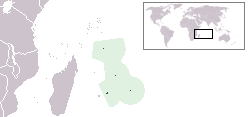 | |
| Capital | Port Louis |
| Official languages | English[1][2] |
| Vernacular | Mauritian Creole, French, English, |
| Demonym(s) | Mauritian |
| Government | Parliamentary republic |
| Sir Anerood Jugnauth | |
| Navin Ramgoolam | |
| Independence from the United Kingdom | |
• Date | 12 March 1968 |
• Republic | 12 March 1992 |
| Area | |
• Total | 2,040 km2 (790 sq mi) (179th) |
• Water (%) | 0.05 |
| Population | |
• 2008 estimate | 1,288,000[3] (151st) |
• 2000 census | 1,179,137 |
• Density | 631.4/km2 (1,635.3/sq mi) (18th) |
| GDP (PPP) | 2009 estimate |
• Total | $16.050 billion[4] |
• Per capita | $12,526[4] |
| GDP (nominal) | 2009 estimate |
• Total | $8.761 billion[4] |
• Per capita | $6,838[4] |
| HDI (2007) | Error: Invalid HDI value (81st) |
| Currency | Mauritian rupee (MUR) |
| Time zone | UTC+4 (MUT) |
• Summer (DST) | UTC+5 (2008 only)[5][6] |
| Driving side | left |
| Calling code | 230 |
| ISO 3166 code | MU |
| Internet TLD | .mu |
Mauritius (Template:Pron-en; French: Maurice pronounced [mɔˈʁis], Mauritian Creole: Moris), officially the Republic of Mauritius (French: République de Maurice) is an island nation off the coast of the African continent in the southwest Indian Ocean, about 900 kilometres (560 mi) east of Madagascar. In addition to the island of Mauritius, the Republic includes the islands of Cargados Carajos, Rodrigues and the Agalega Islands. Mauritius is part of the Mascarene Islands, with the French island of Réunion 200 km (120 mi) to the southwest and the island of Rodrigues 570 km (350 mi) to the northeast.
Uninhabited until the 17th century, the island was ruled first by the Dutch and then by the French after the Dutch abandoned it. The British took control during the Napoleonic Wars and Mauritius became independent from the UK in 1968. Mauritius is a parliamentary republic and is a member of the Southern African Development Community, the Common Market for Eastern and Southern Africa, the African Union and the Commonwealth of Nations.
The main languages spoken in Mauritius are Mauritian Creole, French and English. English is the only official language but the lingua franca is Creole and the newspapers and television programmes are usually in French.[7] Ethnically, the majority of the population is Indian, but there are also many people of African descent on the island. There are also European and Chinese minorities. It is the only African nation where the largest religion is Hinduism although Christianity and Islam also have significant populations.
The island of Mauritius is renowned for having been the only known home of the dodo. First sighted by Europeans around 1600 on Mauritius, the dodo became extinct less than eighty years later. Mauritius has an upper-middle income economy.
History

Mauritius was uninhabited until being permanently settled by European explorers in the 1600s.[8] The island was known to Arab and Austronesian sailors as early as the 10th century [9]and was originally named Dina Harobi by the Arabs.[10] The Portuguese sailors first visited it in 1507 and established a visiting base leaving the island uninhabited. Five ships of the Dutch Second Fleet were blown off course during a cyclone while on their way to the Spice Islands and landed on the island in 1598, naming it in honor of Prince Maurice of Nassau, the Stadtholder of the Netherlands.[11][12]
In 1638, the Dutch established the first permanent settlement. Because of tough climatic conditions including cyclones and the deterioration of the settlement, the Dutch abandoned the island after nearly a century in 1710.[13] France, which already controlled the neighboring Île Bourbon (now Réunion) took control of Mauritius in 1715 and later renamed it Île de France (Isle of France). Under French rule, the island developed a prosperous economy based on sugar production.
In the Napoleonic Wars (1803–1815) the British set out to gain control of the island. Despite winning the Battle of Grand Port, Napoleon's only naval victory over the British, the French surrendered to a British invasion at Cap Malheureux three months later. They formally surrendered on 3 December 1810, on terms allowing settlers to keep their land and property and to use the French language and law of France in criminal and civil matters. Under British rule, the island's name reverted to the original one. Mauritius then went on to become independent in 1968.
Politics
The Government is elected on a five-year basis. The most recent general elections took place on May 5th 2010 in all the 20 mainland constituencies, as well as the constituency covering the island of Rodrigues. Historically, elections have tended to be a contest between two major coalitions of parties. In international affairs, Mauritius is part of the Indian Ocean Commission, the Southern African Development Community and the Commonwealth of Nations and La Francophonie (French speaking countries), amongst others. A more complete list can be found in the main Politics of Mauritius article.
In 2006, Mauritius asked to be an observing member of Community of Portuguese Language Countries (CPLP) in order to become closer to those countries.[14]
According to the 2009 Ibrahim Index of African Governance, which measures governance using a number of different variables, Mauritius' government earned the highest rank among African nations for "participation and human rights" and "sustainable economic opportunity", as well as earning the highest score in the index overall. Mauritius came second in "rule of law", and fourth in terms of "human development".[15]
| Office Held | Office Holder | Incumbency |
|---|---|---|
| President Head of state Commander in chief |
The Rt.Hon Sir Anerood Jugnauth, QC, KCMG, PC, GCSK | 7 October 2003 |
| Vice President | Angidi Chettiar | 2 November 2007 |
| Prime Minister Minister of Defence & Home Affairs |
The Hon. Dr Navinchandra Ramgoolam GCSK ,MP | 5 July 2005 |
| Deputy Prime Minister | Dr. Rashid Beebeejaun, GCSK,MP | 7 July 2005 |
| Vice Prime Minister Minister of Social Integration |
Hon. Xavier Luc Duval GCSK ACCA, MP | 7 July 2005 |
| Vice Prime Minister Finance Minister Of Mauritius |
The Hon.Pravind Jugnauth, MP | 11 May 2010 |
| Senior Minister National Social Security Minister |
The Hon. Mrs Sheilabai Bappoo GOSK, MP | 7 July 2005 |
| Leader of the Opposition | The Hon. Paul Raymond Bérenger GCSK, MP | 7 July 2005 |
Military and police
Mauritius does not have a standing army. All military, police, and security functions are carried out by 10,000 active-duty personnel under the command of the Commissioner of Police. This consists of an 8,000 member National Police which is responsible for domestic law enforcement, a 1,500 member Special Mobile Force (SMF), and a 500-member National Coast Guard.
Geography
Together with Réunion and Rodrigues, Mauritius is part of the Mascarene Islands. This archipelago was formed in a series of undersea volcanic eruptions 8-10 million years ago, as the African plate drifted over the Réunion hotspot. They are no longer volcanically active, and the hotspot now rests under Réunion. The island of Mauritius itself is formed around a central plateau, with its highest peak in the southwest, Piton de la Petite Rivière Noire at 828 metres (2,717 ft). Around the plateau, the original crater can still be distinguished from several mountains.
The island's capital and largest city is Port Louis, in the northwest. Other important towns are Rose-Hill and Beau-Bassin, Curepipe, Vacoas, Phoenix, Quatre Bornes.
-
Map of Mauritius
-
Satellite image of Mauritius, February 2003, with traced outline of island
-
Beach scenery on Rodrigues Island, part of the Republic of Mauritius
Climate
The local climate is tropical, modified by southeast trade winds; there is a warm, dry winter from May to November and a hot, wet, and humid summer from November to May. Anti-cyclones affect the country during May to September. Cyclones affect the country during November-April. Hollanda (1994) and Dina (2002) were the worst two last cyclones to have affected the island.
Environment
The environment in Mauritius is typically tropical in the coastal regions with forests in the mountainous areas. Seasonal cyclones are destructive to the flora and fauna, however they recover quickly.
Mauritius has a Ministry of Environment that is responsible for the cleanliness of the island. One of its tasks is garbage and litter collection at public places, and it does an admirable job in the areas it services. Environmental complaints can be filed online and requests for Environmental Awareness can also be made.[16] The country also has a special department in the police force known as 'la police de l'environment' assigned to patrol the island and having the necessary authority to arrest and prosecute environmental trespassers. In this effect, an Environmental Appeal Tribunal has been established. Numerous statutory bodies have been set up to help monitor compliance with the ever-increasing number of stringent laws that are voted to keep up with growing environmental pressures. Official Environmental Standards have been been established and Environmental Impact Assessments are requested in respect of any activity or project that one proposes to undertake. There exists also a National Environment Fund which provides the necessary financial resources to undertake projects in view of upholding the country's environmental standards. An Environment protection Fee is further levied on all designed establishments.[17] Litter is discarded at will by the indiginous population at beaches which the MOE doesn't service and that the environment police doesn't monitor, thereby spoiling the "wild" beaches.[citation needed]
The estuaries are becoming polluted due to garbage which is dumped into the ravines by the refuse companies contracted by the Ministry Of Environment, inland ravines are utilised extensively as refuse dumps, this creates a huge problem with regards to toxic water flow into the various estuaries, this also has a adverse effect on various marine life.[citation needed]
Districts and dependencies
The island of Mauritius itself is divided into nine districts:
- Black River (Capital: Bambous)
- Flacq (Capital: Centre de Flacq)
- Grand Port (Capital: Mahébourg)
- Moka (Capital: Quartier Militaire)
- Pamplemousses (Capital: Triolet)
- Plaines Wilhems (Capital: Beau Bassin and Rose Hill, Phoenix)
- Port Louis (Capital of Mauritius)
- Rivière du Rempart (Capital: Mapou)
- Savanne (Capital: Souillac)
Dependencies
- Rodrigues, an island 560 kilometres (350 mi) north-east of Mauritius, which attained limited autonomy in October 2002.[18][19] It had the status of the 10th administrative district of Mauritius before autonomy was attained.[20]
- Agalega, two small islands about 933 kilometres (580 mi) north of Mauritius, famous for supplying chickens.
- Cargados Carajos, also known as the Saint Brandon islands, about 402 kilometres (250 mi) north of Mauritius.
Fishing Banks within EEZ
Four submerged fishing banks are mentioned in government documents because they fall within EEZ limits:
- Soudan Banks (including East Soudan Bank)
- Nazareth Bank
- Saya de Malha Bank
- Hawkins Bank
Claimed as Dependencies
Mauritius also claims the following territories:[21]
- Tromelin Island, currently in French possession.
- Chagos Archipelago, currently a British possession as the British Indian Ocean Territory (BIOT).
Economy
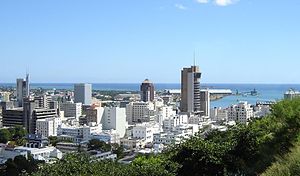
Since independence in 1968, Mauritius has developed from a low-income, agriculturally based economy to a middle income diversified economy with growing industrial, financial, and tourist sectors. For most of the period, annual growth has been of the order of 5% to 6%. This has been reflected in increased life expectancy, lowered infant mortality and improved infrastructure.
Estimated at US$12,356 for 2009 at purchasing power parity (PPP),[22] Mauritius has the sixth-highest GDP per capita in Africa, behind Seychelles (US$19,274 at PPP), Equatorial Guinea (US$16,853 at PPP), Gabon (US$14,421 at PPP), Libya (US$14,381 at PPP) and Botswana (US$13,417 at PPP).The economy is mainly dependent on sugarcane plantations, tourism, textiles, and services, but other sectors such as Seafood processing, information technology and medical tourism are rapidly developing as well. Mauritius, Libya, and Seychelles are the only three African nations with a "high" Human Development Index rating (Réunion, as part of France, is not listed by the UN in their Human Development Index ranking).
Sugar cane is grown on about 90% of the cultivated land area and accounts for 25% of export earnings. However, a record-setting drought severely damaged the sugar crop in 1999. The government's development strategy centres on foreign investment. Mauritius has attracted more than 9,000 offshore entities; many aimed at commerce in India and South Africa while investment in the banking sector alone has reached over $1 billion. Economic performance during the period from 2000 through 2004 combined strong economic growth with unemployment at 7.6% in December 2004. France is the country's biggest trading partner, has close ties with the country, and provides technical assistance in various forms.
In order to provide locals with access to imports at lower prices and attract more tourists going to Singapore and Dubai, Mauritius is gearing towards becoming a duty-free island within the next four years. Duty has been eliminated for several products and decreased for more than 1850 products including clothing, food, jewelry, photographic equipment, audio visual equipment and lighting equipment.[23] In addition, reforms aimed at attracting new business opportunities have also been implemented. But, one of the biggest impediments is the traffic movement between the towns, which is slowing the development of Mauritius. The corporate tax has recently been reduced to 15% to encourage non resident companies to trade or invest through a permanent establishment or otherwise.
Mauritius ranks first among all countries in FDI inflows to India, with cumulative inflows amounting to US$10.98 billion. The top sectors attracting FDI inflows from Mauritius between January 2000 and December 2005 were electrical equipment, telecommunications, fuels, cement and gypsum products and services sector (financial and non-financial).[24]
Transportation
The only available means of inland public transport, so far, are via taxi cabs and buses. [citation needed]
Transport in Mauritius has been free since July 2005 for students, the disabled and seniors. Transport has always been problematic around Port-Louis, the capital city, due to severe traffic jams. These are caused by both a lack of planning, and tolerance of hawkers or street vendors who occupy the pavements and streets of the capital.[citation needed]
The country's major airport is Sir Seewoosagur Ramgoolam International Airport, which is the main base of the national airline, Air Mauritius.
Education
Education from pre-primary through to secondary is free for each citizen born in the country.
Before 2001, most prestigious schools used to be called "Star Schools" and each year, the CPE pupils would compete against each other to gain entrance to those schools based on a ranking system. In 2001, the government - with Steven Obeegadoo as minister of Education - decided that there would be an educational reform in Mauritius. The ranking system was abolished and replaced by the grading system coupled with the regionalisation system which advocates going to a school near one's residence. In February 2006, with Dharambeer Gokhool as minister of Education, the "A+" system, which is similar to the pre-2001 system, was introduced. CPE students now need to get "A+" in all their subjects to gain admission to "National Colleges" which consequently became as much coveted as the "Star Schools" were before the reform.[25]
The following is a list of the "National Colleges" in no particular order.[26][27][28]
Top schools
- New Eton College (boys)
- Le Bocage International School (mixed)
- St.m Esprit College (boys)
- Dr Maurice Curé State College (girls)
- Droopnath Ramphul State College (girls)
- Gaëtan Raynal State College (girls)
- John Kennedy College (boys)
- Mahatma Gandhi Institute (mixed)
- Queen Elizabeth College (girls)
- Royal College, Curepipe - Port Louis (boys)
- Royal College, Port-Louis (boys)
- Sir Abdool Raman Osman (boys)
- Sookdeo Bissoondoyal State College (boys)
- Loretto Convent College Rose Hill (girls)
Demographics
The population estimate for the whole republic is 1,264,867. For the island of Mauritius only, as at 31 December 2007, it is 1,227,078.[29] Mauritian society includes people from many different ethnic groups. The republic's residents are the descendants of people from India (Indo-Mauritian), continental Africa (Mauritian Creole people usually known as 'Creoles' in Mauritian Creole), France (Franco-Mauritian) and China (Sino-Mauritian), among other places.
Religion
Hindus make up 48%, Roman Catholic 23.6%, other Christians 8.6%, Muslim 16.6% and non-religious 0.4% while other and unspecified religions up to 2.5 and 0.3% respectively.[30]
Most Franco-Mauritians and Mauritian Creoles are Christian. Almost all the Muslims and the Hindu population are of Indian origin. Some Muslims are also from the Middle East[citation needed]. Hindus include Mauritians of ancestry coming from Marathi, Tamil, Hindi, Bhojpuri and Telugu speaking regions of India. These languages are still preserved through the existence of different socio-cultural organizations and with the school systems obliging primary schools' students to study an oriental language. A minority of people are of Chinese descent, many of whom have embraced Christianity, following mainly Roman Catholicism. Some follow Buddhism and Confucian traditions.
Language
The Mauritian Constitution makes no mention of an official language and its one million citizens speak either Mauritian Creole, a French-based creole, English or French. It is only in the Parliament that the official language is English but any member of the National Assembly can still address the chair in French.[1][31] However, English is generally accepted as the official language of Mauritius and as the language of government administration, the courts and business. The lingua franca is Creole.[7] In Mauritius, people switch languages according to the situation.[32] French and English, which have long enjoyed greater social status, are favored in educational and professional settings.[32] Also, most newspapers and media communications are in French.[33] Mauritian Créole, which is spoken by 90 percent of the population, is considered to be the native language of the country and is used most often in informal settings.[32] It was developed in the 18th century by slaves who used a pidgin language to communicate with each other as well as with their French masters, who did not understand the various African languages. The pidgin evolved with later generations to become a casual language.[33] Mauritian Creole is a French-based creole due to its close ties with French pronunciation and vocabulary.[34]
Other languages spoken in Mauritius include Hindi, Tamil, Telugu, Marathi, Urdu, Hakka (a Chinese dialect), Gujarati, and Bhojpuri, which is an amalgamation of several Indian dialects spoken by the early Indian settlers.[7] Most Mauritians are at least bilingual, if not trilingual.[7][33][35][36]
Culture

The cuisine of Mauritius is a blend of Indian, Creole, Chinese and European influences. It is common for a combination of cuisines to form part of the same meal.
The production of rum, which is made from sugar cane, is widespread on the island. Sugarcane was first introduced to Mauritius by the Dutch in 1638. The Dutch mainly cultivated sugarcane for the production of "arrack", a precursor to rum. However, it was during the French and British administrations that sugar production was fully exploited. Pierre Charles François Harel was the first to propose the concept of local distillation of rum in Mauritius, in 1850. Beer is also produced on the Island, by the Phoenix Brewery.
The sega is a local folklore music. Sega has African roots and the main traditional instruments for producing the music are goat-skin percussion instruments called ravane and metallic clicks using metal triangles. The songs usually describe the miseries of slavery, and has been adapted nowadays as social satires to voice out inequalities as felt by the blacks. Men are usually at the instruments while women perform an accompanying dance which is often erotic.[37]
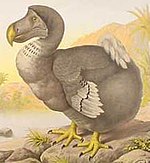
In 1847, Mauritius became the fifth location in the world to issue postage stamps. The two types of stamps issued then, known as the Mauritius "Post Office" stamps, consisting of a "Red Penny" and a "Blue Two Pence" denomination, are probably the most famous and valuable stamps in the world.[citation needed]
When it was discovered, the island of Mauritius was the home of a previously unknown species of bird, which the Portuguese named the dodo (simpleton), as they appeared to be not too bright. By 1681, all dodos had been killed by the settlers or by their domesticated animals. An alternate theory suggests that the imported wild boars that were set free destroyed the slow-breeding dodo population. The dodo is prominently featured as a supporter of the national coat-of-arms (see above).
The island has also given rise to a diversified literature in French, English and Creole. Jean-Marie Gustave Le Clézio, the 2008 recipient of the Nobel Prize in Literature, is of Franco-Mauritian origin and lives on the island for part of each year.
In Mauritius, the following festivals — Diwali, Mahashivratri, Christmas, Cavadee, Chinese New Year, Père Laval, and Eid Al-Fitr — are celebrated.[37]
Recreational activities in Mauritius are quite varied to support the local tourism industry. Water sports are facilitated as the island is surrounded with coral reef, providing plenty of relatively shallow and calm water. Activities such as deep sea fishing, surfing, windsurfing, water-skiing, cruising in yachts and even submarines are some of the many water based recreations available. Although it seldom breaks, Tamarin Bay is one of the world's most famous surfing spots.
Land-based leisure activities include golf, tennis, skiing, sea diving, deer hunting, quad & mountain biking, abseiling, zip lining, horse riding and trekking. However, all these are most often practiced by the elite only.
Electrical power
Mauritius uses a 220 Volt 50 Hz AC mains supply. The plugs are Type C and Type G:
-
"Europlug" (CEE 7/16)
-
Type G / BS1363 Fused 13 A
International rankings
| Survey | Organisation | Ranking |
|---|---|---|
| 2010 EPI | Environmental Performance Index | 6 out of 163 |
| 2010 Index of Economic Freedom | Heritage Foundation/The Wall Street Journal | 12 out of 179 |
| Corruption Perceptions Index 2008 | Transparency International | 41 out of 180 |
| Ease of Doing Business Index (2010 report) | World Bank Group | 17 out of 183 |
| Digital Opportunity Index (2007) | International Telecommunication Union | 50 out of 181 |
| Press Freedom Index (2007) | Reporters Without Borders | 25 out of 169 |
| Human Development Index (2008) | United Nations Development Programme | 74 out of 177 |
See also
- Outline of Mauritius
- The Mauritius Command, a novel by Patrick O'Brian
- The Mauritius Scout Association
References
- ^ a b "Article 49 of The Constitution". National Assembly of Mauritius. Retrieved 2009-02-08.
- ^ "Republic of Mauritius, Government Portal (Mauritius)".
- ^ Department of Economic and Social Affairs
Population Division (2009). "World Population Prospects, Table A.1" (.PDF). 2008 revision. United Nations. Retrieved 2009-03-12.
{{cite journal}}: Cite journal requires|journal=(help); line feed character in|author=at position 42 (help) - ^ a b c d "Mauritius". International Monetary Fund. Retrieved 2010-04-21.
- ^ Mauritius turns the clock forward in October 2008
- ^ Mauritius will not repeat daylight saving time
- ^ a b c d Coexistence International at Brandeis University
- ^ Mauritius, Réunion & Seychelles. Lonely Planet. 2007. p. 37. ISBN 1741047277, 9781741047271. Retrieved 2010-01-28.
{{cite book}}: Check|isbn=value: invalid character (help); More than one of|pages=and|page=specified (help); Unknown parameter|coauthors=ignored (|author=suggested) (help) - ^ "CIA - The World Factbook -- Mauritius". CIA. Retrieved 2007-05-04.
- ^ Mountain, Alan; et al. "Mauritius". This is Mauritius. p. 15.
{{cite book}}: Explicit use of et al. in:|first=(help); Text "lang_fr" ignored (help) - ^ Mutch, T. D. (1942). The First Discovery of Australia. Sydney: Project Gutenberg of Australia. p. 55., p.13.
- ^ The Hudson River in North America was first named "Mauritius River" for the same Stadtholder.
- ^ Changing Definitions of Ethnic Boundaries on Mauritius
- ^ "Mauritius and Equatorial Guinea granted associated observer status in CPLP". macauhub.com. 2006-07-17. Retrieved 2007-03-05.
- ^ Moibrahim Foundation
- ^ government website
- ^ Environment protection Act
- ^ "First Day Cover: Rodrigues Regional Assembly". The Mauritius Post Ltd. 2004-10-12. Retrieved 2007-06-27.
- ^ "Rodrigues: achievements after three years of autonomy". Government of Mauritius. 2005-10-25. Retrieved 2007-06-27.
- ^ "Facts about the land, people, history, government, political conditions, foreign relations of Mauritius. - Government and political conditions". Bureau of African Affairs. U.S Department of State. 2007. Retrieved 2007-06-22.
{{cite web}}: Unknown parameter|month=ignored (help) - ^ "CIA - The World Factbook -- Mauritius". CIA. Retrieved 2007-11-194.
{{cite web}}: Check date values in:|accessdate=(help) - ^ "GDP PPP".
- ^ Duty-free plan in Mauritius, Trend-News.com, 04-06-2005
- ^ "India and Mauritius To Work For Greater FDI Inflow into India's Infrastructure". Government of India, Department of Commerce. 2006-04-18. Retrieved 2008-10-11.
{{cite news}}: Cite has empty unknown parameter:|coauthors=(help) - ^ Education Reform Implementation
- ^ "Cabinet Decisions". August 2007. Retrieved 2009-09-07.
- ^ CPE 2008 Admission to form I on a National basis
- ^ "SSS de Piton, France-Boyer-de-la-Giroday (Plaine-Magnien) et Sir-Leckraz-Teelock (Flacq)" are also Star Schools
- ^ "Population and Vital Statistics, Republic of Mauritius, Year 2007 - Highlights". Central Statistics Office (Mauritius). 2008. Retrieved 2008-05-26.
{{cite web}}: Unknown parameter|month=ignored (help) - ^ https://www.cia.gov/library/publications/the-world-factbook/geos/mp.html
- ^ Mauritius defies anglophone past to embrace French language
- ^ a b c English Usage in Mauritius
- ^ a b c Facts and Figures
- ^ Holm, J. (1989). Pidgins and Creoles. New York: Cambridge University Press. p. 476., p.353.
- ^ Circular Migration Agreement will enable Mauritians work in France
- ^ Most Mauritians Bilingual
- ^ a b Macdonald, Fiona; et al. "Mauritius". Peoples of Africa. pp. 340–341.
{{cite book}}: Explicit use of et al. in:|first=(help)
Further reading
- Macdonald, Fiona (2001). "Mauritius". Peoples of Africa. US: Marshall Cavendish. ISBN 9780761471585.
{{cite book}}: Unknown parameter|coauthors=ignored (|author=suggested) (help) - Mountain, Alan (2000). This is Mauritius. Struik. ISBN 9781843303015.
{{cite book}}: Unknown parameter|coauthors=ignored (|author=suggested) (help) - Eisenlohr, Patrick (2006). Little India: Diaspora, Time, and Ethnolinguistic Belonging in Hindu Mauritius. Berkeley: University of California Press. ISBN 9780520248809.
- Dodd, Jan and Madeleine Philippe. Lonely Planet Mauritius Reunion & Seychelles.Lonely Planet Publications, 2004. ISBN 1-74059-301-4
- Lee, Jacques: Mauritius: Its Creole Language - The Ultimate Creole Phrase Book and Dictionary, Paperback 160 pages (August 15, 2005), Publisher: Nautilus, ISBN 0-9511296-4-3.
- Lee, Jacques: Sega: The Mauritian Folk Dance, Paperback 104 pages (December 1990), Publisher: Nautilus, ISBN 0-9511296-1-9
- Khal Torabully, Coolitude : An Anthology of the Indian Labour Diaspora (with Marina Carter, Anthem Press, London, 2002) ISBN 1-84331-003-1
External links
- Government of Mauritius
- "Mauritius". The World Factbook (2024 ed.). Central Intelligence Agency.
- Mauritius from UCB Libraries GovPubs
- Mauritius at Curlie
 Wikimedia Atlas of Mauritius
Wikimedia Atlas of Mauritius- Template:Wikitravel
- Mauritius
- African countries
- African Union member states
- Countries of the Indian Ocean
- Island countries
- Islands of Africa
- Islands of the Indian Ocean
- English-speaking countries and territories
- Extinct volcanoes
- Former Dutch colonies
- French-speaking countries
- Hotspot volcanoes
- Liberal democracies
- Member states of La Francophonie
- Members of the Commonwealth of Nations
- Miocene volcanism
- Republics
- States and territories established in 1968
- Volcanoes of Mauritius






